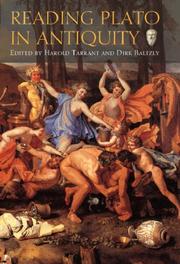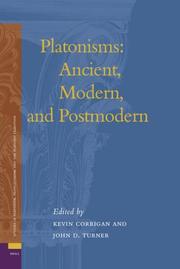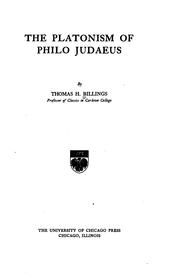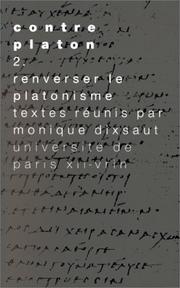| Listing 1 - 10 of 30 | << page >> |
Sort by
|

ISBN: 0715634550 9780715634554 Year: 2006 Publisher: London: Duckworth,
Abstract | Keywords | Export | Availability | Bookmark
 Loading...
Loading...Choose an application
- Reference Manager
- EndNote
- RefWorks (Direct export to RefWorks)
Platonists. --- Philosophy, Ancient. --- Platoniciens --- Philosophie ancienne --- Plato --- Plato. --- Influence. --- Plato - Influence.
Book
ISBN: 9780307378194 9781782395577 1782395571 0307378195 0307456722 9780307456724 Year: 2014 Publisher: New York : Pantheon,
Abstract | Keywords | Export | Availability | Bookmark
 Loading...
Loading...Choose an application
- Reference Manager
- EndNote
- RefWorks (Direct export to RefWorks)
"From the acclaimed writer and thinker--whose award-winning books include both fiction and non-fiction--a dazzlingly original plunge into the drama of philosophy, revealing its hidden but essential role in today's debates on love, religion, politics, and science. Imagine that Plato came to life in the 21st century and set out on a multi-city speaking tour: How would he handle a host on Fox News who challenges him on religion and morality? How would he mediate a debate on the best way to raise a child between a Freudian psychoanalyst and a Tiger Mom? How would he answer a neuroscientist who, about to scan Plato's brain, argues that all his philosophical problems can be solved by our new technologies? What would he make of Google, and the idea that knowledge can be crowdsourced rather than reasoned out by experts? With a philosopher's depth and a novelist's imagination, Rebecca Newberger Goldstein probes the deepest issues confronting us--from sexuality and child-rearing to morality and the meaning of life--by allowing us to eavesdrop on Plato as he encounters the modern world. By reviving the Platonic art of the dialogue for the 21st century, she demonstrates that the questions he first posed continue to confound and enlarge us"--
Philosophy, Modern --- Imaginary conversations. --- Philosophie --- Conversations imaginaires --- Plato --- Influence. --- Philosophy - History. --- Philosophy. --- Plato - Influence. --- Plato.
Book
ISSN: 0768102X ISBN: 9782020976176 202097617X Year: 2009 Publisher: Paris: Seuil,
Abstract | Keywords | Export | Availability | Bookmark
 Loading...
Loading...Choose an application
- Reference Manager
- EndNote
- RefWorks (Direct export to RefWorks)
Idéal est un mot d'Europe : il s'y retrouve d'une langue à l'autre, seule diffère la façon de le prononcer. Or qu'en advient-il quand on sort d'Europe, notamment quand on passe en Chine ? Car il n'est pas banal d'avoir isolé dans la vie de l'esprit cette représentation unitaire, détachée de l'affectif, qu'on appelle « idée ». Il l'est encore moins d'avoir imaginé reporter sur elle, promue en « idéal » séparé du monde, la fixation du désir : au point de faire de cette abstraction le mobile d'une humanité prête à s'y sacrifier. Cet idéalisme platonicien - il est vrai - nous a lassés. Mais on redécouvrira à neuf, le considérant de Chine, quelle invention audacieuse il a été ; et, plus encore, quelle dramatisation de l'existence un tel coup de force a su inspirer. Or, sur cette scène de l'idéal, le rideau ne viendrait-il pas de tomber ? Ou que devient une « Europe » rompant avec l'Idéal ?
Philosophy --- Idealism --- Idealism, Chinese --- Ideals (Philosophy) --- Philosophy, European --- Plato --- Influence --- Philosophical Essay --- S12/0820 --- China: Philosophy and Classics--Comparative philosophy --- Plato - Influence --- Idéal (philosophie) --- Europe --- Philosophie --- Chine
Book
ISBN: 9782849413593 2849413593 Year: 2013 Publisher: Paris: Bourin,
Abstract | Keywords | Export | Availability | Bookmark
 Loading...
Loading...Choose an application
- Reference Manager
- EndNote
- RefWorks (Direct export to RefWorks)
Ontology. --- Virtual reality. --- Image (Philosophy) --- Ontologie --- Réalité virtuelle --- Image (Philosophie) --- Plato --- Influence. --- Ontology --- Virtual reality --- Influence --- Réalité virtuelle --- Plato - Influence
Book
ISBN: 9781905670277 1905670273 Year: 2010 Volume: 107 Publisher: London: University of London. Institute of classical studies,
Abstract | Keywords | Export | Availability | Bookmark
 Loading...
Loading...Choose an application
- Reference Manager
- EndNote
- RefWorks (Direct export to RefWorks)
Stoics --- Philosophy, Ancient --- Stoïcisme --- Philosophie ancienne --- Plato --- Aristotle --- Influence. --- Aristotle. --- Criticism and interpretation --- Criticism, Textual --- Influence --- Plato - Criticism and interpretation --- Plato - Criticism, Textual --- Plato - Influence
Book
ISSN: 07784600 ISBN: 9782711629695 2711629694 Year: 2020 Publisher: Paris: Vrin,
Abstract | Keywords | Export | Availability | Bookmark
 Loading...
Loading...Choose an application
- Reference Manager
- EndNote
- RefWorks (Direct export to RefWorks)
La méthode platonicienne de division a souvent été jugée sévèrement par les commentateurs modernes. Pourtant, dans l'Antiquité et au début du Moyen Âge, cette méthode a été prise au sérieux par de nombreux philosophes issus de courants divers, tantôt certes pour la critiquer, mais tantôt également pour se la réapproprier en l'adaptant au contexte de leur propre pensée. Ils l'appliquèrent à des domaines aussi variés que la zoologie, l'éthique, l'épistémologie, l'ontologie et la théologie, et ce qui pouvait de prime abord paraître un simple outil dialectique devint un puissant instrument philosophique, allant jusqu'à s'identifier, chez Jean Scot Érigène, au mode de fonctionnement de la pensée divine créatrice. L'histoire de cette réception n'avait encore jamais été écrite. Le présent volume cherche à combler cette lacune en insistant sur ses moments les plus remarquables.
Plato --- Johannes Scotus Eriugena --- Division. --- Philosophie antique. --- Platon --- Influence. --- Division (Philosophy) --- Philosophy, Ancient --- Philosophy, Medieval --- Division (Philosophy). --- Dialectic. --- Philosophy, Ancient. --- Philosophy, Medieval. --- Plato - Influence.
Book
ISBN: 9024720605 940099706X 9400997043 9789024720606 Year: 1977 Publisher: The Hague: Nijhoff,
Abstract | Keywords | Export | Availability | Bookmark
 Loading...
Loading...Choose an application
- Reference Manager
- EndNote
- RefWorks (Direct export to RefWorks)
History of philosophy --- Plato --- Influence --- -Aflāṭūn --- Aplaton --- Bolatu --- Platon, --- Platonas --- Platone --- Po-la-tʻu --- Pʻŭllatʻo --- Pʻŭllatʻon --- Pʻuratʻon --- Πλάτων --- אפלטון --- פלאטא --- פלאטאן --- פלאטו --- أفلاطون --- 柏拉圖 --- 플라톤 --- Influence. --- -Influence --- Aflāṭūn --- Platon --- Platoon --- Платон --- プラトン --- Plato - Influence

ISSN: 1871188X ISBN: 9789004158412 9004158413 9786612397066 1282397060 9047420160 Year: 2007 Volume: 4 Publisher: Leiden: Brill,
Abstract | Keywords | Export | Availability | Bookmark
 Loading...
Loading...Choose an application
- Reference Manager
- EndNote
- RefWorks (Direct export to RefWorks)
The present volume argues that Plato and Platonism should be understoof not as a series of determinate doctrines or philosophical facts to be pinned down once and for all, but rather as an inexhaustible mine of possible trajectories. The book examines in this light different strands of Platonic thinking from the dialogues themselves through later Antiquity and the Medieval World into Modernity and Post-Modernity with new essays ranging from Descartes, Kant, Hegel, and Natorp to Yeats, Levinas and Derrida. It also suggests the possibility of reading the dialogues and the whole tradition resonating in and through them in new, unexpected ways.
Platonists. --- Neoplatonism. --- Platoniciens --- Néo-platonisme --- Plato --- Influence. --- Néo-platonisme --- Neoplatonism --- Platonists --- Platonism --- Philosophers --- Philosophy, Ancient --- Alexandrian school --- Church history --- Hellenism --- Philosophy --- Theosophy --- Aflāṭūn --- Aplaton --- Bolatu --- Platon, --- Platonas --- Platone --- Po-la-tʻu --- Pʻŭllatʻo --- Pʻŭllatʻon --- Pʻuratʻon --- Πλάτων --- אפלטון --- פלאטא --- פלאטאן --- פלאטו --- أفلاطون --- 柏拉圖 --- 플라톤 --- Platon --- Platoon --- Платон --- プラトン --- Influence --- Plato - Influence

ISBN: 0824096088 9780824096083 Year: 1979 Volume: 3 Publisher: New York (N.Y.): Garland,
Abstract | Keywords | Export | Availability | Bookmark
 Loading...
Loading...Choose an application
- Reference Manager
- EndNote
- RefWorks (Direct export to RefWorks)
Philo, --- Plato --- Influence --- Aflāṭūn --- Aplaton --- Bolatu --- Platon, --- Platonas --- Platone --- Po-la-tʻu --- Pʻŭllatʻo --- Pʻŭllatʻon --- Pʻuratʻon --- Πλάτων --- אפלטון --- פלאטא --- פלאטאן --- פלאטו --- أفلاطون --- 柏拉圖 --- 플라톤 --- Alexandria, --- Filon --- Filón, --- Filon, --- Filone, --- Philon, --- Philonis, --- Yedidyah, --- פילון --- פילון מאלכסנדריה --- פילון, --- פילון היהודי --- Филон Александрийский --- Filon Aleksandriĭskiĭ --- Pseudo-Philo --- Influence. --- Platon --- Platoon --- Платон --- プラトン --- Philo, - of Alexandria --- Plato - Influence

ISBN: 2711611868 9782711611768 9782711611867 2711611760 Year: 1995 Publisher: Paris: Vrin,
Abstract | Keywords | Export | Availability | Bookmark
 Loading...
Loading...Choose an application
- Reference Manager
- EndNote
- RefWorks (Direct export to RefWorks)
Plato --- Influence --- -Aflāṭūn --- Aplaton --- Bolatu --- Platon, --- Platonas --- Platone --- Po-la-tʻu --- Pʻŭllatʻo --- Pʻŭllatʻon --- Pʻuratʻon --- Πλάτων --- אפלטון --- פלאטא --- פלאטאן --- פלאטו --- أفلاطون --- 柏拉圖 --- 플라톤 --- -Influence --- --Platon, --- Aflāṭūn --- Influence. --- Platon --- Platoon --- Platonisme --- Plato. --- Платон --- プラトン --- Platon, 428-348 av JC --- Plato - Influence --- Platon (0427?-0348? av. J.-C.) --- Philosophie --- Critique et interprétation --- 20e siècle
| Listing 1 - 10 of 30 | << page >> |
Sort by
|

 Search
Search Feedback
Feedback About UniCat
About UniCat  Help
Help News
News